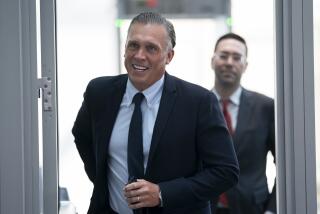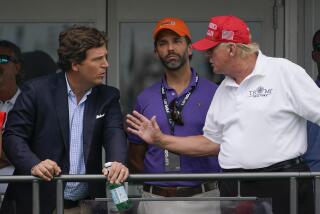Focus Shifts to Reagan’s Contra Role : McFarlane to Say President OKd Support for Rebels
WASHINGTON — Former National Security Adviser Robert C. McFarlane will tell a congressional investigating panel today that President Reagan authorized his staff to arrange alternative support for Nicaragua’s contras after direct U.S. military aid was cut off by Congress in 1984, sources said Sunday.
At the same time, McFarlane will emphasize that the President never approved any violation of the law, sources said. The former Marine, who resigned as Reagan’s top foreign policy aide in December, 1985, previously has said that he has no firsthand evidence that the President knew about the diversion of profits from the Iranian arms sales to the contras.
Heightens Legal Issue
McFarlane’s testimony before hearings of the Senate and House committees investigating the scandal is certain to intensify the debate among the members over whether it was legal for White House officials to be arranging private contributions to the contras. An amendment authored by Rep. Edward P. Boland (D-Mass.) prohibited both direct and indirect U.S. military assistance during 1985 and 1986.
Sen. Warren B. Rudman (R-N.H.), vice chairman of the Senate committee, said on ABC’s “This Week With David Brinkley” that the President did nothing illegal by telling his staff to arrange alternative support for the contras, even though the private initiative “got out of hand and illegal acts were done.”
“The more important issue is whether the American people think that’s a very good idea,” Rudman said. “But I don’t think that the President of the United States would have committed a crime if he said: ‘Congress says no U.S. money (and) as commander in chief, with my constitutional authority, I’ll do what I think I have to do.’ ”
Expected to Cite Order
McFarlane, in his opening statement to the committee, is expected to testify that, after the aid cutoff in 1984, the President ordered his staff to take steps to help sustain the contras until their human rights record improved enough to persuade Congress to restore aid. At the time, members of Congress were upset about reported atrocities committed by the contras.
He also is expected to tell the panel that the President did not specify how the continued support for the contras was to be arranged, sources said. As it turned out, that task primarily was undertaken by the staff of the National Security Council, which solicited private donations from American citizens as well as contributions from foreign governments, such as Saudi Arabia.
Rudman said that he views the activities of the NSC staff as a possible violation of the Boland amendment’s prohibition against indirect U.S. aid to the contras.
“It seems to me that if a bunch of people in the White House are using time and equipment and telephones and so forth, that . . . is certainly a violation of the indirect aid within the Boland amendment,” he said. “But then it falls back into the conflict with the Constitution as to whether or not the President of the United States can carry on foreign policy without appropriated funds.”
Rudman noted that even though the White House obtained an opinion from the Intelligence Oversight Board that such an initiative would be legal, none of the President’s aides sought a weightier legal opinion from the Justice Department.
Appearing on CBS’ “Face the Nation,” Rep. Dick Cheney (R-Wyo.) said that, while the Boland amendment prohibited the CIA and other intelligence agencies from helping the contras, the NSC staff is not part of the intelligence community as defined by a 1981 executive order signed by the President.
‘It’s Fuzzy’
“It’s a gray area, it’s fuzzy,” he said. “You do have a legitimate debate, it seems to me, of whether or not the NSC is covered by the Boland amendment.”
Sen. David L. Boren (D-Okla.), another committee member who appeared on CBS, said that the President should not have tried to circumvent the congressional ban on aid to the contras, whether or not his efforts were technically legal. “It is a very, very dangerous thing when we start down the slippery slope of trying to get around the law,” he said.
Sen. Daniel K. Inouye (D-Hawaii), the Senate committee chairman, said on ABC that the President clearly knew more about the private contra-supply network than he has admitted publicly. Inouye’s judgment is based on Reagan’s confidential, handwritten diaries, which were made available to the committee.
“We’ve got enough to suggest to the people of the United States that the President of the United States was a bit more knowledgeable than he professes to publicly,” he said.
No Illegality Cited
If it can be proved that Reagan authorized his aides to help the contras by any means, he added, “it would tarnish the President’s image.” But Inouye stopped short of saying that blanket authorization from Reagan would constitute an illegal act.
McFarlane is also expected to be questioned by the committee about why he told the House Intelligence Committee in a letter in October, 1985, that no one on the NSC staff was helping the contras, officially or unofficially. The former White House aide is said to be prepared to apologize for his attempts to mislead Congress.
In addition, The Times reported on Sunday that McFarlane is expected to provide new evidence of an apparent attempt to cover up Reagan’s approval of an Israeli shipment of U.S. arms to Iran in late 1985. Sources said he will be asked specifically to clear up conflicting testimony over who in the White House sought to mask Reagan’s role in an official chronology prepared last November after the matter became known.
Retired Maj. Gen Richard V. Secord, the private middleman in the Iran-contra affair, testified last week that he was told by White House aide Oliver L. North that McFarlane was responsible for the misleading sections of the chronology; McFarlane has said previously that when he asked at the time who was responsible, no one at the White House owned up to it.
Concern for Well-Being
McFarlane, who tried unsuccessfully to take his own life with a overdose of sleeping pills shortly after the scandal became public, certainly will be questioned gingerly by many committee members who are concerned about his personal well-being.
“We try to be sensitive to human feelings and human need,” Boren said.
Nonetheless, Cheney said that McFarlane must answer for his actions. “He will have to answer some tough questions,” he said. “I don’t expect the committee to go too gentle on him.”
More to Read
Sign up for Essential California
The most important California stories and recommendations in your inbox every morning.
You may occasionally receive promotional content from the Los Angeles Times.










